Photo AI
Last Updated Sep 26, 2025
Opposition Simplified Revision Notes for A-Level Edexcel History
Revision notes with simplified explanations to understand Opposition quickly and effectively.
449+ students studying
Opposition
📌 Opposition
Despite his strengthened position from wartime success and the ensuing cult of personality, Stalin remained convinced that members of the party and the public were plotting against him. This pervasive paranoia fueled irrational fears of opposition, leading to severe and unjustified actions. Stalin remained suspicious of everyone despite the extent of his control.
Stalin's cult of personality
- His personal dominance was unchallenged and by 1945 Stalin was at the height of his power
- Military leaders constituted a threat, Zhukov was banished to an obscure command in the Urals and he was erased from the press
- Stalin was celebrated as the architect of victory, a film was made on the fall of Berlin which showed no staff or generals, only Stalin and his loyal secretary directing the battle
- Between 1946-48 senior commanders were executed on trumped-up treason charges
- The war escalated and fed the cult
- Paintings showed Stalin in God-like solitude or with Lenin, the paintings would sometimes appear to tell Lenin what to do, Stalin lost his role as a disciple – was now an equal, or even the master
- Celebrations of his 70th birthday were extremely elaborate
- Galas and greetings almost every day
- From December 21st, 1949, to August 1951
- A giant portrait of Stalin was suspended over Moscow and lit up at night by a battery of searchlights
- Stalin was in love with himself and he was treated as the saviour of Russia
- One brief visit to the vicinity of the front was treated as though it were crucial to Red Army success
- Annotated biography of himself, adding praise where he thought it was insufficient
Increasing paranoia
- With age, Stalin became even more suspicious of those around him, Between 1946-48 senior commanders were executed on trumped-up treason charges
- Purges and terror remained part of Stalin's government system
- Used more selectively
- Stalin's health deteriorated after the war
- Appeared much less frequently in public
- Retreated to private residences
The Leningrad Affair, 1949
Zhdanov
- was a heavy drinker
- Died suddenly in 1948 of a heart attack
- Rumours spread that he had been killed by his doctors
- A savage purge of the Leningrad Party organisation followed
- Engineered by Beria and Malenkov
- Probably to gain influence and deal with potential rivals
- Voznesensky was a member of the Politburo
- Was responsible for planning the Soviet war economy which was so successful after 1942
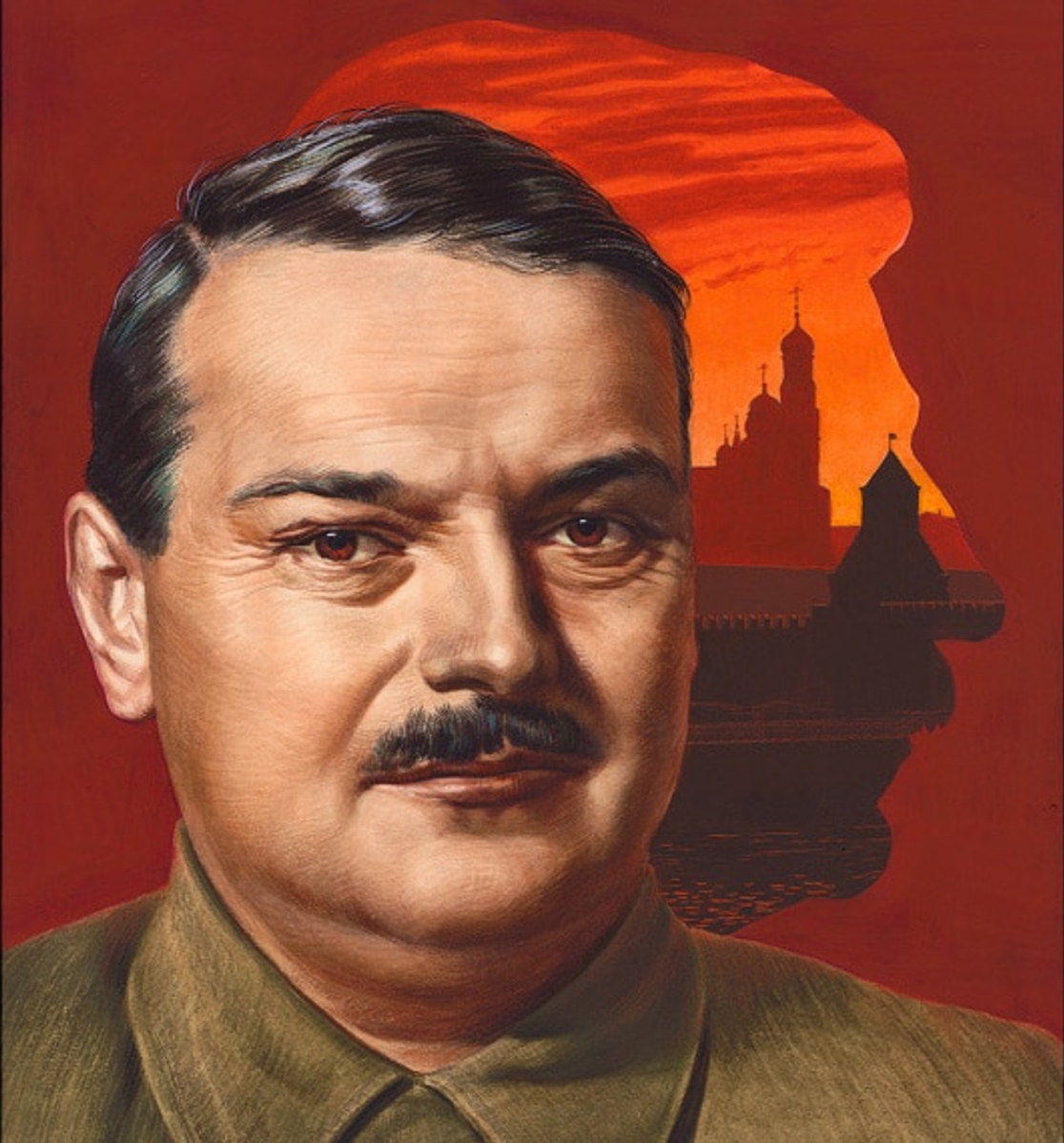
Andrei Zhdanov
- By 1948 was second only to Stalin in the Council of Ministers
- Stalin did not like war heroes
- Voznesensky and Kuznetsov were widely tipped as Stalin's successors
- Also likely he thought the Leningraders were becoming a little too confident and independent
- Leading Leningrad Party and gov officials were arrested
- Forced to confess, tried in secret and executed
- This included Voznesensky and Kuznetsov
- Before the secret 'trial' Politburo members had signed the accused's death warrants
- The Leningrad affair made everybody at the top feel insecure
- Feeling heightened by the arrest of Molotov's wife
Continued Purges
Georgia 1951:
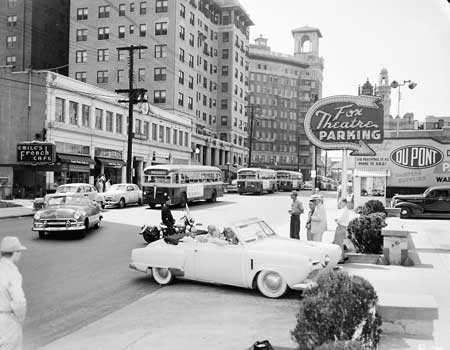
Atlanta, Ga. - 1951
- Stalin ordered the arrest of several Mingrelian Party members and government officials
- Were accused of being involved in a Mingrelian nationalist plot
- Beria was a Mingrelian
- The victims were all close to him
- Compelled to carry out the purge
- Added to his sense of insecurity
- Stalin's meals were tasted for poison
- Routes of travel regularly changed
- Some historians claim he was becoming more detached from reality and paranoid
- Saw Jews as American Fifth Columnists
- Party leaders feared his mood swings
- Voznesensky was arrested after a cordial supper with Stalin
- Parties at Stalin's Dacha involved heavy drinking and making guests seem ridiculous
- Forced to sing and dance
- Stalin used these events to test them, get info and inspire jealousy
- Some historians suggest he displayed the same personality traits he had throughout his life
- Most agree he had become morose, vindictive and unpredictable
Doctors' Plot
- Stalin grew more suspicious towards the end of his life
- Even turned against his daughter, personal bodyguards, and loyal retainers
- The Doctor's plot is further evidence of his increasingly suspicious nature
- Jan 1953: Pravda announced that 13 doctors were accused of conspiring with the USA and killing Zhdanov and other high-ranking officials
- Several of these doctors were Jewish and treated top Party officials
- Was said they planned to wipe out the top Soviet leadership
- Confessions obtained under torture
- Two of the doctors died during this
- Before the rest could be executed, Stalin died
- Subsequently, the plot was declared a fabrication
- MVD (the NKVD) officers were executed
📌 Khrushchev vs Opposition
Khrushchev and opposition
- Molotov, Kaganovich and Voroshilov were hardliners
- Strongly opposed to Khrushchev's secret speech
- Malenkov had been a reformer but bitterly resented his treatment by Khrushchev
- They looked for their chance to oust him
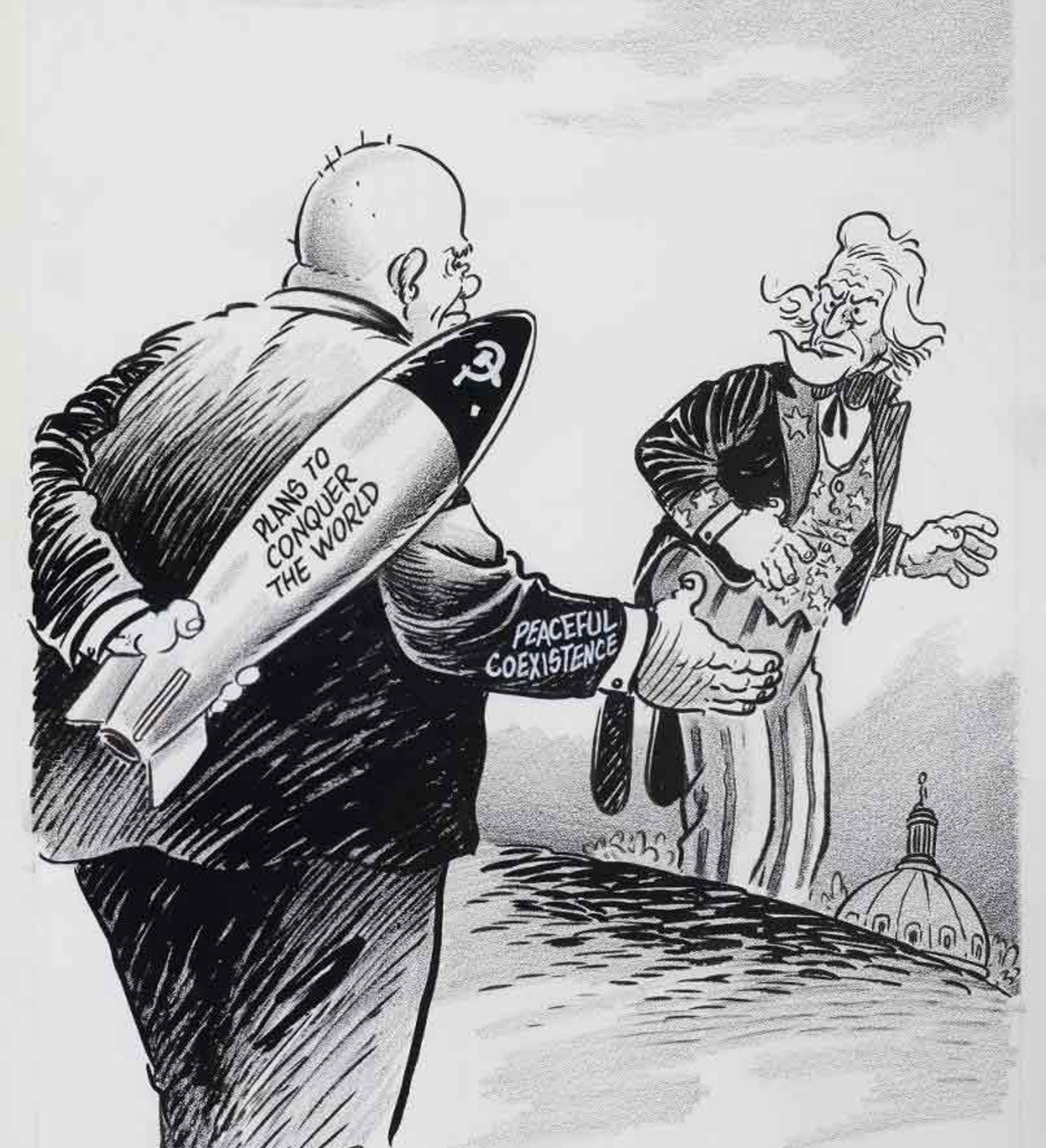
Khrushchev and opposition
The Anti-Party Group
- Unrest in Poland and the Hungarian uprising were used by hardliners to argue that Khrushchev's undermined the credibility, unity and strength of the international communist movement
- Khrushchev too liberal for them
- Was not just the hardliners who had been alienated
- The presidium majority were angered by his abolition of the central economic ministries
- Weakened their power
- Prepared to challenge Khrushchev
- His style of leadership was becoming increasingly assertive
- Unpredictable and ill-considered initiatives across foreign and domestic policy were cited as the reason for the need to remove him
June 1957:
- Khrushchev outvoted seven to four
- He appealed to the Central Committee which elected him the First Secretary
- Also had the support of the head of the army, Zhukov
- Had the support of the head of the KGB
- Made sure that members of the Central Committee resolution were assembled quickly
- Flew in members from all over the USSR, Khrushchev promoted many of them and prevailed
- Referred to his opponents as the 'Anti-Party group'
- Central Committee resolution expelled them
- Denounced them for opposing Party Policy on a range of issues over the previous three or four years
- Molotov was castigated for his long years as Stalin's Foreign Minister
- Echoed the Stalin years
- Kaganovich feared for his life and called Khrushchev
- Gave Khrushchev the chance to make clear the difference between his and Stalin's regime
- Kaganovich and his colleagues were sent a long way from Moscow and given humiliating jobs.
- Kaganovich was sent to manage a cement factory in the Urals
- Molotov made ambassador to Mongolia
- Malenkov was sent to look after a hydroelectric plant in Kazakhstan
- The fact that Khrushchev had been in a minority in the Presidium was not made public
- Did not take over as Prime Minister from Bulganin
- Bulganin had been part of the Anti-Party group until 1958
Khrushchev removes Zhukov
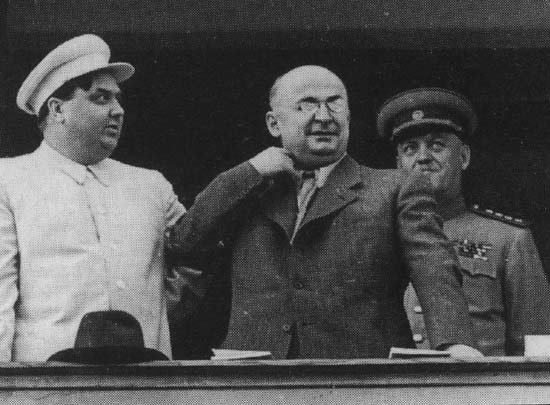
Khrushchev removes Zhukov
- Zhukov had been a vital support to Khrushchev in the removal of Beria and the defeat of the Anti-Party Group
- After this Zhukov became more assertive
- Had a big reputation and a big ego
- Had been Defence Minister from 1955
- Summer of 1957 introduced some military reforms without consulting the Party
- Wanted to develop a purely professional army
- Khrushchev determined to make the Party supreme and to strengthen his position
- Seen as a direct threat to Party control
- Zhukov was dismissed from the Presidium and Central Committee
- Khrushchev knew he had other Soviet marshals on his side
- They resented Zhukov's style
- New Minister of Defence, Marshal Malinovsky, was more pliable
- The years 1957-60 were his best
- Had more freedom of action than ever before
- Also became more authoritarian and arrogant
22nd Party Congress 1961
- Even after the defeat of the Anti-Party group Khrushchev still faced opposition
- From inside the Party
- Did not push anti-Stalinism for a while
- At the 21 Congress in 1959, Stalinism was not raised
- Khrushchev resumed his attack on Stalin at the 22 Congress in 1961
- New info about the purges was given
- Along with emotionally charged assessments of Stalin
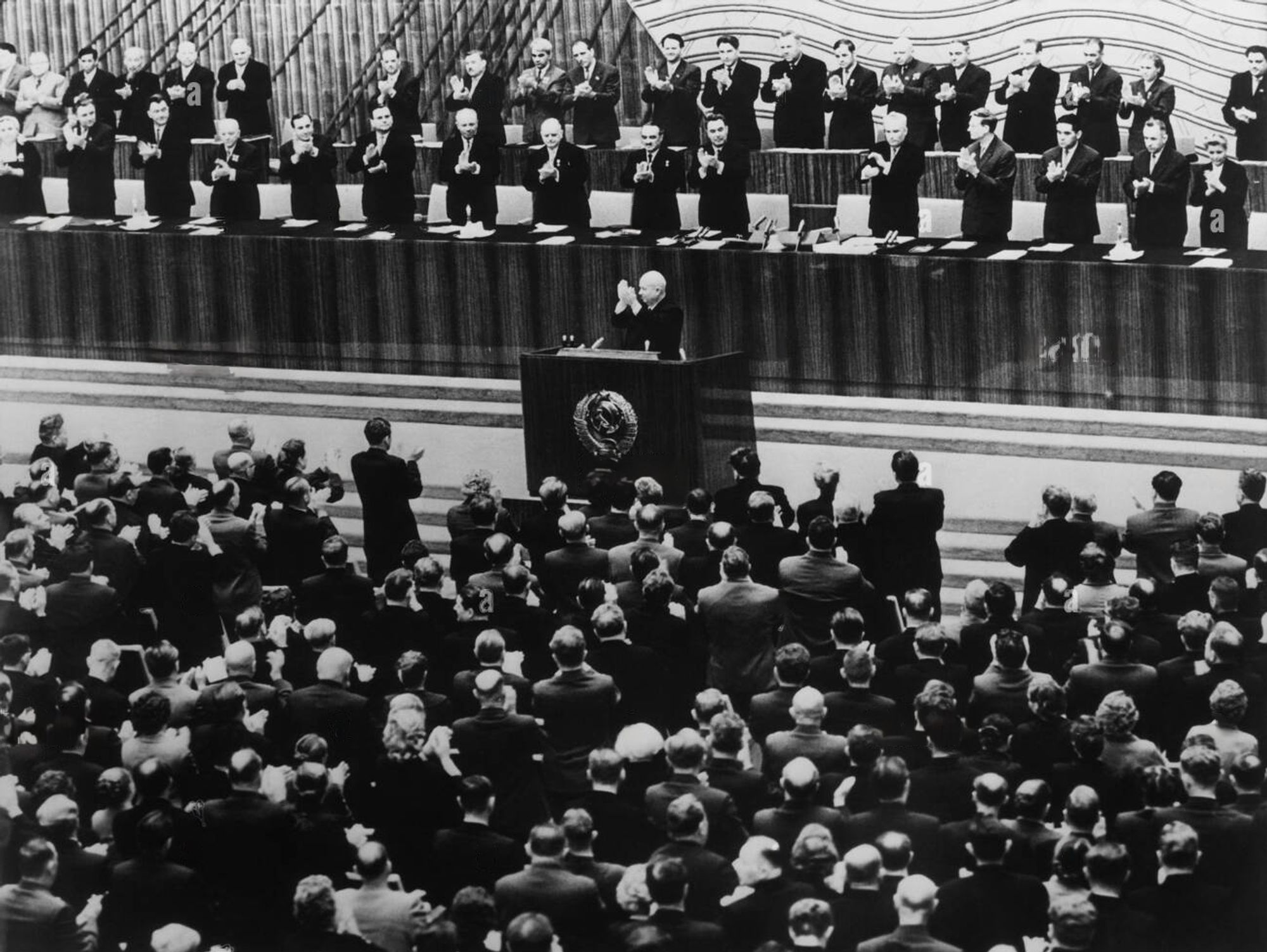
22nd Party Congress 1961
- An old Bolshevik D.A. Lazurkina took the platform
- She was a 77-year-old, active participant in the Oct Revolution who joined the Party in 1902
- She had been imprisoned by the Tsar and Stalin
- Informed the delegates that Lenin had appeared to her in a dream
- He had made it clear to her that he did not like lying beside Stalin in the mausoleum
Ending Lenin's discomfort was only one of the measures taken as a result of this speech:
- Stalin's mummified body was removed from the Lenin Mausoleum and reburied in a simpler grave by the Kremlin wall
- Places named after Stalin were renamed
- E.g. Stalingrad became Volgograd and Stalino became Donetsk
- Monuments of Stalin were destroyed
- Khrushchev proposed that a memorial to Stalin's victims be built in Moscow (didn't happen)
Novocherkassk
- Solidly working-class Ukrainian town
- 1 June 1962, they rebelled
- Reduction in wages and increase in prices coincided
- Butter +25%, meat +30%
- A passing train had a placard hung on it saying 'Cut up Khrushchev for sausages'
- The Party HQ was occupied
- Troops were brought in
- 28 killed, 80 injured
- Bodies buried overnight in unmarked graves
- The Square where the shootings took place was asphalted over that night
- There was a News Blackout
- This was only reported 30 years later
- The nature of this protest was typical of the Khrushchev era
Overall protests
- Estimated that 500,000 people protested during the years 1953-64
- According to Ludmilla Alexeyeva, these years were an 'incubation period where people began to learn about the problems of Soviet life.'
Nature of Dissent under:
Stalin
- Largely spontaneous and volatile
- Often centred on angry peasants and workers
Khrushchev
- Involved both workers and peasants and a few members of the intelligentsia
- Did not act together, however
Brezhnev
- More legalistic and sober criticism
- Mainly from a small proportion of intelligentsia in the big cities
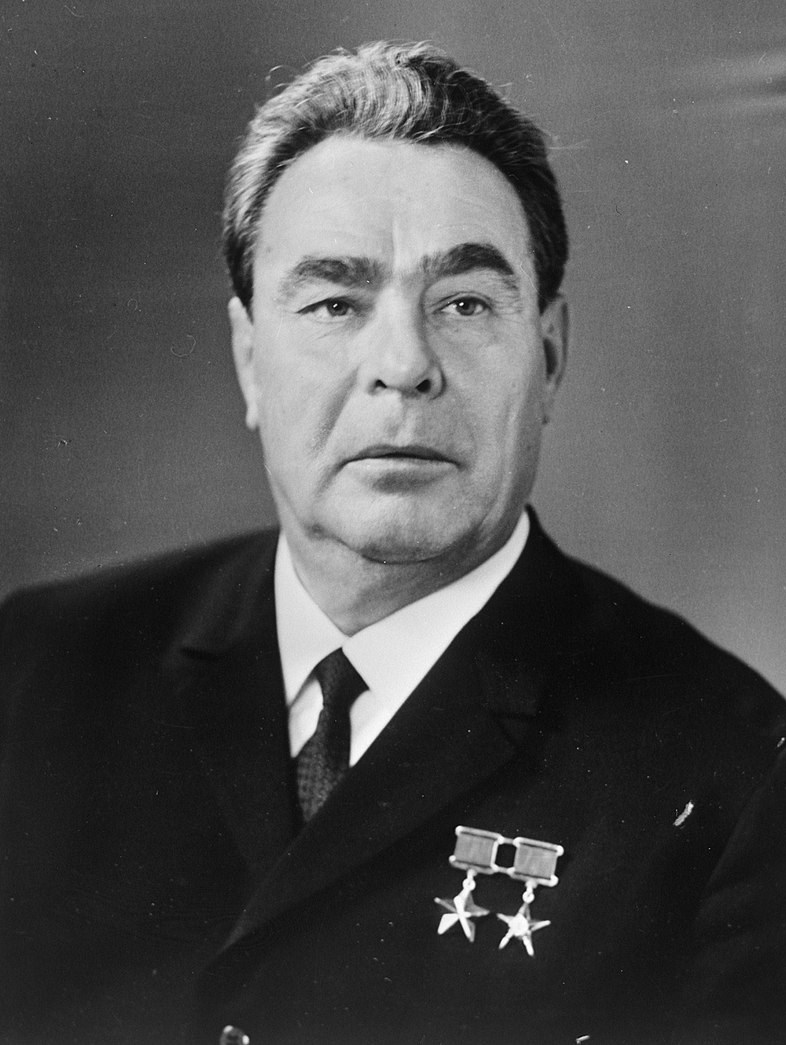
Leonid Brezhnev
Dealing with dissent
- Workers' demands were relieved through a cap on prices and increased consumer goods
- Despite the increasing cost of production
- Caused huge economic problems
- Intelligentsia and political dissent were rooted out through a deep network of informants
- After the 1956 Hungarian Uprising, more people were jailed in 1957-58 than at any other time since Stalin's death
- The idea that Khrushchev was somewhat more liberal is a clear exaggeration
- The USSR was still a very authoritarian state
Cultural Dissent
- By the 1960s cultural dissenters were one of the most powerful anti-communist force
- Literature and arts became the voice of the people
- Samizdat: self-publishing
- People were fully aware of the implications of their publications
- Became an underground, widespread network
- A collective endeavour
- Became a way of spreading political and factual info
- Poetry readings in Mayakovsky Square in Moscow expanded to include controversial issues
- The KGB intervened and broke them up
- The young Vladimir Bukovsky was taken to a police station and beaten up
- He was warned he would be killed the next time he went to Mayakovsky Square
- Became a leading dissident
- Best known for exposing the use of psychiatric hospitals against dissidents
- He had been confined to one between 1963 and 1965
500K+ Students Use These Powerful Tools to Master Opposition For their A-Level Exams.
Enhance your understanding with flashcards, quizzes, and exams—designed to help you grasp key concepts, reinforce learning, and master any topic with confidence!
360 flashcards
Flashcards on Opposition
Revise key concepts with interactive flashcards.
Try History Flashcards25 quizzes
Quizzes on Opposition
Test your knowledge with fun and engaging quizzes.
Try History Quizzes29 questions
Exam questions on Opposition
Boost your confidence with real exam questions.
Try History Questions27 exams created
Exam Builder on Opposition
Create custom exams across topics for better practice!
Try History exam builder120 papers
Past Papers on Opposition
Practice past papers to reinforce exam experience.
Try History Past PapersOther Revision Notes related to Opposition you should explore
Discover More Revision Notes Related to Opposition to Deepen Your Understanding and Improve Your Mastery
96%
114 rated
The Stalinist dictatorship and reaction 1941–1964
Political authority opposition and the state of Russia in wartime
218+ studying
200KViews96%
114 rated
The Stalinist dictatorship and reaction 1941–1964
Political authority and government to 1953
311+ studying
188KViews96%
114 rated
The Stalinist dictatorship and reaction 1941–1964
Political authority and government
212+ studying
191KViews96%
114 rated
The Stalinist dictatorship and reaction 1941–1964
Economic and social developments
244+ studying
190KViews